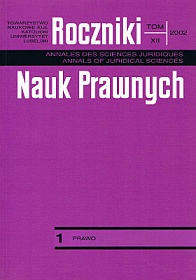Forms of Bans on the Limitation of Trade in the American Law
Abstract
The primary aim of the antitrust law in the United States i to protect the process of competition. The first and at the same time the most important law in this area is the Sherman Act (1896), a regulation that deems the existing monopolies as illegal, as well as any limitations on trade that seek to curb competition.
Further acts (the Clayton Act 1914, FTC Act 1914) have divided limitations into those that are considered by American antitrust institutions, e.g. Antitrust Division and Federal Trade Commission, on the basis of the rule of reason, and limitations of trade which are illegal perse. The verdicts of the American High Court that have been passed since the 1890s sought to make this distinction more accurate.
Copyright (c) 2002 Roczniki Nauk Prawnych

This work is licensed under a Creative Commons Attribution-NonCommercial-NoDerivatives 4.0 International License.


